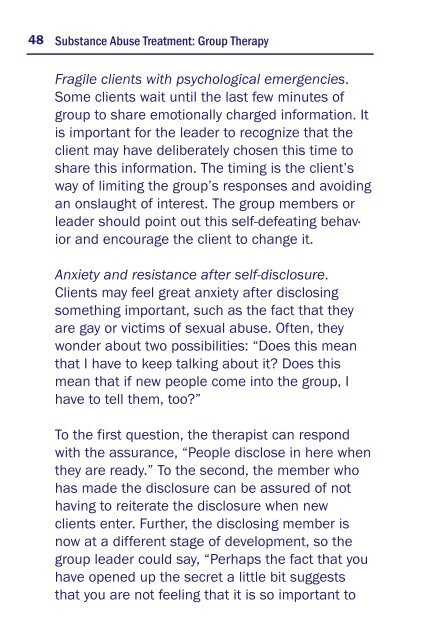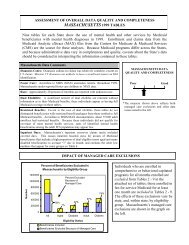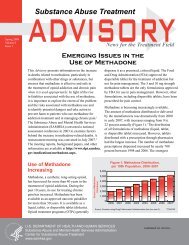Quick Guide for Clinicians - SAMHSA Store - Substance Abuse and ...
Quick Guide for Clinicians - SAMHSA Store - Substance Abuse and ...
Quick Guide for Clinicians - SAMHSA Store - Substance Abuse and ...
You also want an ePaper? Increase the reach of your titles
YUMPU automatically turns print PDFs into web optimized ePapers that Google loves.
48 <strong>Substance</strong> <strong>Abuse</strong> Treatment: Group TherapyFragile clients with psychological emergencies.Some clients wait until the last few minutes ofgroup to share emotionally charged in<strong>for</strong>mation. Itis important <strong>for</strong> the leader to recognize that theclient may have deliberately chosen this time toshare this in<strong>for</strong>mation. The timing is the client’sway of limiting the group’s responses <strong>and</strong> avoidingan onslaught of interest. The group members orleader should point out this self-defeating behavior<strong>and</strong> encourage the client to change it.Anxiety <strong>and</strong> resistance after self-disclosure.Clients may feel great anxiety after disclosingsomething important, such as the fact that theyare gay or victims of sexual abuse. Often, theywonder about two possibilities: “Does this meanthat I have to keep talking about it? Does thismean that if new people come into the group, Ihave to tell them, too?”To the first question, the therapist can respondwith the assurance, “People disclose in here whenthey are ready.” To the second, the member whohas made the disclosure can be assured of nothaving to reiterate the disclosure when newclients enter. Further, the disclosing member isnow at a different stage of development, so thegroup leader could say, “Perhaps the fact that youhave opened up the secret a little bit suggeststhat you are not feeling that it is so important to
















